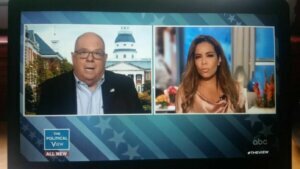This article was republished with permission from WTOP’s news partners at Maryland Matters. Sign up for Maryland Matters’ free email subscription today.
This content was republished with permission from WTOP’s news partners at Maryland Matters. Sign up for Maryland Matters’ free email subscription today.
Gov. Lawrence J. Hogan Jr. (R) doubled down on his decision to hold a more traditional November election during a televised interview on Monday – but his plan to open every polling center in the state is an increasingly daunting task for local election officials.
Hogan appeared on ABC’s “The View” as part of an ongoing effort to promote his forthcoming autobiography, and blasted the Maryland State Board of Elections when asked about his decision to open all of Maryland’s polling centers for the November elections.
“Tens of thousands of people showed up at polls that weren’t open,” Hogan said. “The handful of polls that were open were overcrowded, and it was suppressing people’s vote because they had to wait in line for four hours”
In addition to every registered voter getting an absentee ballot application, Hogan’s plan calls for every polling center to be open for in-person and early voting. With less than 120 days until the election, however, many local boards are facing shortages of both poll workers and polling centers.
There were more than 8,000 vacant poll worker positions across the state as of Friday afternoon, David Garreis, the president of the Maryland Association of Election Officials, said. That’s about a third of the 25,000 workers it takes to run an election.

“We’re going to have polling places that are either understaffed or have no staff at all,” Garreis, who also serves as the deputy director of elections for Anne Arundel County, said. “The election starts with your election judges. If you don’t have the people there, you can’t run the polling place.”
Fears over the pandemic have prompted poll workers, many of whom are elderly, to call it quits across the United States. Garreis said some local boards are looking to consolidate polling centers due to the shortage in election workers.
He added that 73 privately-owned polling centers across the state have pulled out of the election so far, leaving officials scrambling to find new venues for voters to cast their ballots.
“Private locations can refuse to let you use their building, and a lot of them are,” Garreis said. “[Local boards] are consolidating in schools and consolidating in libraries. That’s going to be the solution, because there really is nothing else we can do.”
The struggle to find workers has already begun in Baltimore, Armstead B.C. Jones Sr., the city’s elections director, told members of Baltimore City Council’s Judiciary and Legislative Investigations Committee during a virtual meeting last week.
“We would have to find close to 3,000 election judges to staff those locations,” Jones said. “A lot of our judges are senior citizens, a lot of them won’t be able to come out.”
The State Board of Elections has asked local boards across the state to find out which polling locations will be open in December, State Elections Administrator Linda H. Lamone said during the City Council meeting, adding that “it’s going to be a very difficult situation to manage.”
Election officials, state lawmakers and advocates alike have demanded that Hogan reverse his decision to hold a more traditional election since it was announced earlier this month. Maryland Attorney General Brian E. Frosh (D) blasted Hogan’s decision and said it could lead to voter suppression.
“Bowing to Donald Trump’s reckless demands for in-person voting puts at risk the lives of Maryland citizens and risks disenfranchising many thousands of eligible voters,” Frosh wrote. “Governor Hogan should immediately reverse course and authorize a vote-by-mail election in the November presidential election.
In requiring voters to apply for a mail-in ballot, Hogan hoped to avoid some of the errors that occurred during the state’s largely vote-by-mail June 2 primary. Many voters, particularly those in Baltimore City, received late or incorrect ballots in the lead-up to that election. Voters who opted to go to limited in-person polling centers were met with hours-long lines.
The Centers for Disease Control and Prevention recently released guidance on conducting the November elections. The federal health agency says providing voters multiple options to cast their ballot, like drop-off boxes, early voting and mail-in ballots, is the best way to protect the electorate from COVID-19.
Any reversal would have to happen sooner rather than later, election officials said. Lamone warned that the “point of no return” was just weeks away as local boards of elections prepare for November.
Garreis said local boards will have to send out vote-by-mail ballot applications in August or September at the latest in order to get everyone their actual ballots before the election, and echoed Lamone’s warning that the point of no return is quickly approaching. He cautioned that local boards of elections will likely be processing ballots well after Election Day on Nov. 3.
“In some of your larger jurisdictions, they’re going to be counting ballots almost until the election electoral college convenes” on Dec. 14, he said.
Marylanders don’t have to wait to receive a ballot application in the mail. Voters can also request a mail-in ballot online at the Maryland State Board of Election’s website.







